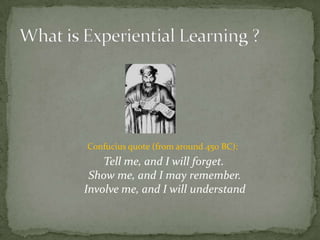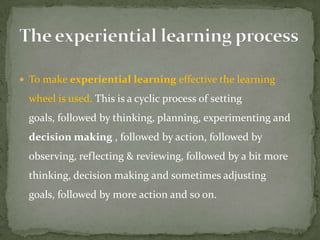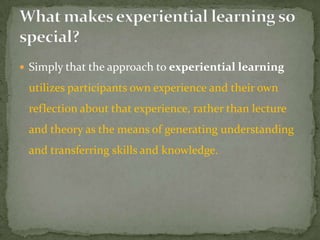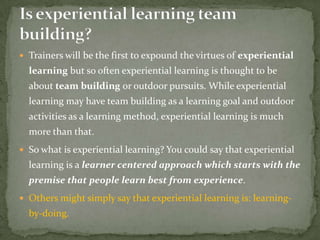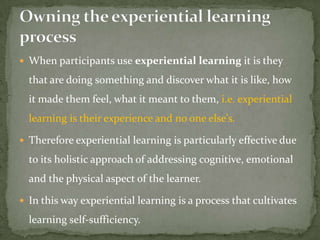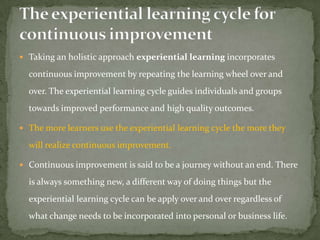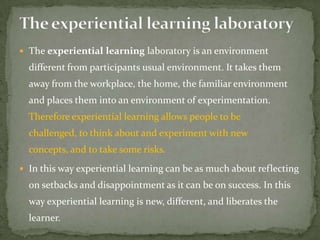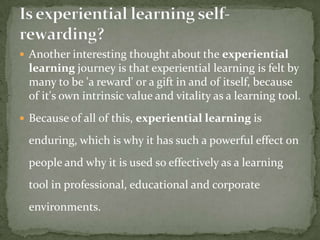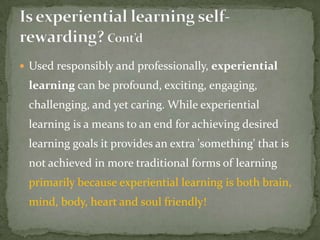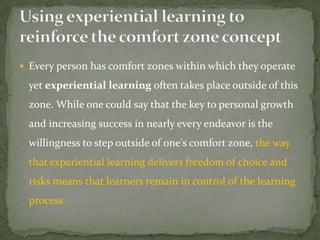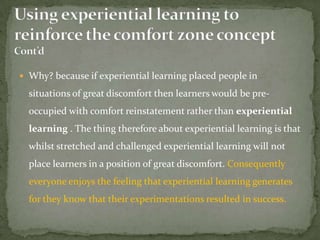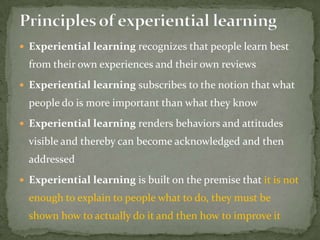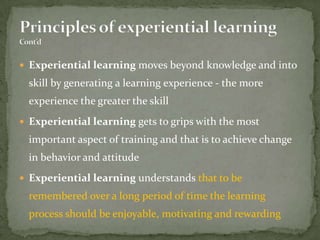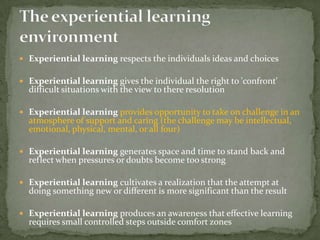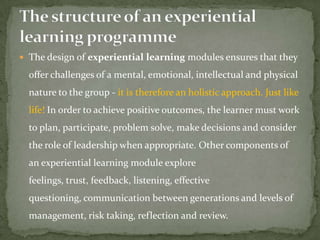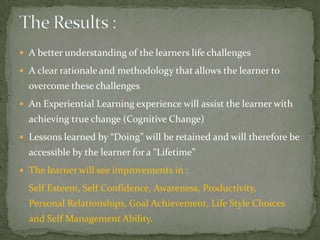What experientiallearning
- 1. Confucius quote (from around 450 BC): Tell me, and I will forget. Show me, and I may remember. Involve me, and I will understand
- 2. ď‚— To make experiential learning effective the learning wheel is used. This is a cyclic process of setting goals, followed by thinking, planning, experimenting and decision making , followed by action, followed by observing, reflecting & reviewing, followed by a bit more thinking, decision making and sometimes adjusting goals, followed by more action and so on.
- 3. ď‚— Simply that the approach to experiential learning utilizes participants own experience and their own reflection about that experience, rather than lecture and theory as the means of generating understanding and transferring skills and knowledge.
- 4. ď‚— Trainers will be the first to expound the virtues of experiential learning but so often experiential learning is thought to be about team building or outdoor pursuits. While experiential learning may have team building as a learning goal and outdoor activities as a learning method, experiential learning is much more than that. ď‚— So what is experiential learning? You could say that experiential learning is a learner centered approach which starts with the premise that people learn best from experience. ď‚— Others might simply say that experiential learning is: learning- by-doing.
- 5. ď‚— When participants use experiential learning it is they that are doing something and discover what it is like, how it made them feel, what it meant to them, i.e. experiential learning is their experience and no one else's. ď‚— Therefore experiential learning is particularly effective due to its holistic approach of addressing cognitive, emotional and the physical aspect of the learner. ď‚— In this way experiential learning is a process that cultivates learning self-sufficiency.
- 6. ď‚— Taking an holistic approach experiential learning incorporates continuous improvement by repeating the learning wheel over and over. The experiential learning cycle guides individuals and groups towards improved performance and high quality outcomes. ď‚— The more learners use the experiential learning cycle the more they will realize continuous improvement. ď‚— Continuous improvement is said to be a journey without an end. There is always something new, a different way of doing things but the experiential learning cycle can be apply over and over regardless of what change needs to be incorporated into personal or business life.
- 7. ď‚— The experiential learning laboratory is an environment different from participants usual environment. It takes them away from the workplace, the home, the familiar environment and places them into an environment of experimentation. Therefore experiential learning allows people to be challenged, to think about and experiment with new concepts, and to take some risks. ď‚— In this way experiential learning can be as much about reflecting on setbacks and disappointment as it can be on success. In this way experiential learning is new, different, and liberates the learner.
- 8. ď‚— Another interesting thought about the experiential learning journey is that experiential learning is felt by many to be 'a reward' or a gift in and of itself, because of it's own intrinsic value and vitality as a learning tool. ď‚— Because of all of this, experiential learning is enduring, which is why it has such a powerful effect on people and why it is used so effectively as a learning tool in professional, educational and corporate environments.
- 9. ď‚— Used responsibly and professionally, experiential learning can be profound, exciting, engaging, challenging, and yet caring. While experiential learning is a means to an end for achieving desired learning goals it provides an extra 'something' that is not achieved in more traditional forms of learning primarily because experiential learning is both brain, mind, body, heart and soul friendly!
- 10. ď‚— Every person has comfort zones within which they operate yet experiential learning often takes place outside of this zone. While one could say that the key to personal growth and increasing success in nearly every endeavor is the willingness to step outside of one's comfort zone, the way that experiential learning delivers freedom of choice and risks means that learners remain in control of the learning process.
- 11. ď‚— Why? because if experiential learning placed people in situations of great discomfort then learners would be pre- occupied with comfort reinstatement rather than experiential learning . The thing therefore about experiential learning is that whilst stretched and challenged experiential learning will not place learners in a position of great discomfort. Consequently everyone enjoys the feeling that experiential learning generates for they know that their experimentations resulted in success.
- 12. ď‚— Experiential learning recognizes that people learn best from their own experiences and their own reviews ď‚— Experiential learning subscribes to the notion that what people do is more important than what they know ď‚— Experiential learning renders behaviors and attitudes visible and thereby can become acknowledged and then addressed ď‚— Experiential learning is built on the premise that it is not enough to explain to people what to do, they must be shown how to actually do it and then how to improve it
- 13. ď‚— Experiential learning moves beyond knowledge and into skill by generating a learning experience - the more experience the greater the skill ď‚— Experiential learning gets to grips with the most important aspect of training and that is to achieve change in behavior and attitude ď‚— Experiential learning understands that to be remembered over a long period of time the learning process should be enjoyable, motivating and rewarding
- 14. ď‚— Experiential learning respects the individuals ideas and choices ď‚— Experiential learning gives the individual the right to 'confront' difficult situations with the view to there resolution ď‚— Experiential learning provides opportunity to take on challenge in an atmosphere of support and caring (the challenge may be intellectual, emotional, physical, mental, or all four) ď‚— Experiential learning generates space and time to stand back and reflect when pressures or doubts become too strong ď‚— Experiential learning cultivates a realization that the attempt at doing something new or different is more significant than the result ď‚— Experiential learning produces an awareness that effective learning requires small controlled steps outside comfort zones
- 15. ď‚— The design of experiential learning modules ensures that they offer challenges of a mental, emotional, intellectual and physical nature to the group - it is therefore an holistic approach. Just like life! In order to achieve positive outcomes, the learner must work to plan, participate, problem solve, make decisions and consider the role of leadership when appropriate. Other components of an experiential learning module explore feelings, trust, feedback, listening, effective questioning, communication between generations and levels of management, risk taking, reflection and review.
- 16.  A better understanding of the learners life challenges  A clear rationale and methodology that allows the learner to overcome these challenges  An Experiential Learning experience will assist the learner with achieving true change (Cognitive Change)  Lessons learned by “Doing” will be retained and will therefore be accessible by the learner for a “Lifetime”  The learner will see improvements in : Self Esteem, Self Confidence, Awareness, Productivity, Personal Relationships, Goal Achievement, Life Style Choices and Self Management Ability.
